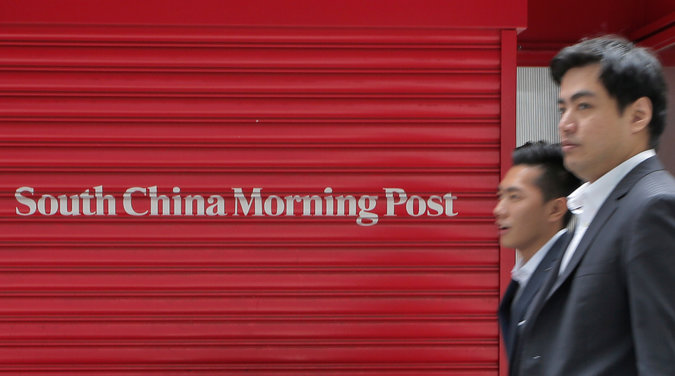Last December, Chinese internet giant Alibaba announced plans to buy influential Hong Kong-based English-language newspaper the South China Morning Post. Ahead of the acquisition, company officials announced plans to make all digital content free. The South China Morning Post today reports that as of April 5, when the acquisition completes, the SCMP’s online paywall will come down:
At a critical time when media companies in Hong Kong and around the world are either closing down or engaged in severe cost-cutting to survive, the Post is bucking the trend after the acquisition of the 113-year-old newspaper and its media assets by China’s internet giant, Alibaba Group.
“[With the paywall taken down today] our focus now should not be on finding the right media business model. Our priority should be on how we should change to better adapt to the reading habits of our readers,” Alibaba Group executive chairman Jack Ma said. “This is what we need to do as the media industry transforms for the future.”
“Alibaba Group’s vision of bringing together the SCMP’s heritage and editorial strength together with its technological prowess offers an assuring roadmap for the SCMP’s passage into the digital realm with enhanced clarity and boosted confidence,” South China Morning Post Publishers chief executive officer Robin Hu said.
Editor-in-Chief Tammy Tam added: “With the paywall removal, it paves the way for the SCMP to grow its readership globally. It is our firm belief that as China plays an increasingly critical role in world politics and the economy, a global community of China stakeholders will demand insightful and trusted news and commentaries from a within-the-region perspective.” [Source]
After last year’s announcement of the imminent purchase, concerns surfaced that the paper—long known for objective coverage of sensitive issues in China—would forfeit some editorial independence when under control of a mainland-based company with deep ties to the government. Alibaba officials explained that one objective of the purchase was to offset “biased” portrayals of China from Western media that influences the Wall Street-listed company’s share prices, with more “fair and accurate” coverage.
Alibaba’s command over the SCMP comes as the Xi administration is involved in a largely successful campaign to discredit Western media in the eyes of the Chinese public, and amid a steady tightening of control over domestic media that has recently attracted backlash from several high-profile media figures. While on a tour of leading state media outlets in February, Xi Jinping stressed that official media must “speak for the Party,” asked state news bureaus abroad to better tell China’s story to the world, and called for the creation of “flagship media with strong international influence.” This week, state-owned Shanghai Media Group launched Sixth Tone, an English-language new media venture. Sixth Tone is sister publication to hip web-2.0 style news blog The Paper (澎湃), which debuted in 2014 after Xi called for an upgrade to traditional state propaganda. At The New York Times, Didi Kirsten Tatlow reports on Sixth Tone’s place within the parallel trends of increased government control over the media, Beijing’s external propaganda push, and the desire to reach younger media consumers:
Now The Paper’s owner has set its sights elsewhere. On Wednesday it is set to publicly kick off an English-language version called Sixth Tone in hopes of making its recipe for success in China work abroad.
Some government pressure is inescapable, says Wei Xing, its editor and the former deputy editor in chief of The Paper. “There are two paths you can choose,” he said. One is to simply complain, he said, but “we want to be part of the conversation, both global and domestic.”
[…] China’s big technology companies have noticed the appetite for news. The Alibaba Group, the Chinese e-commerce giant, last year agreed to buy a minority stake in television-and-newspaper operator China Business News for nearly $200 million. Late last year it also purchased the South China Morning Post, an English-language newspaper in Hong Kong, though executives have said they will use that to target a global audience.
[…] “Traditional media is in a major crisis as advertising falls,” said Zhong Xin, a professor of journalism at Renmin University of China. “Readers are leaving for online. Far fewer people are watching TV.” […] [Source]
The Paper’s coverage of a recently revealed vaccine scandal became the target of state censors last month.
Last week at Tea Leaf Nation, Bethany Allen-Ebrahimian and David Wertime reported on the WeChat fueled efforts of overseas Chinese students to spread copies of China Daily while Xi was in town for the 2016 Nuclear Security Summit.








